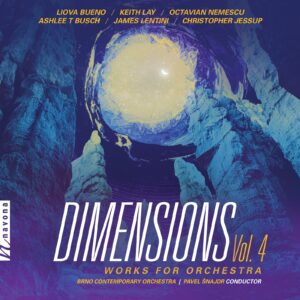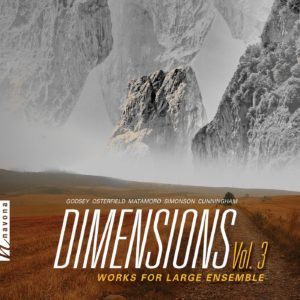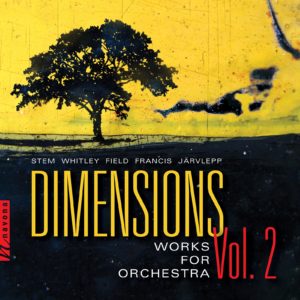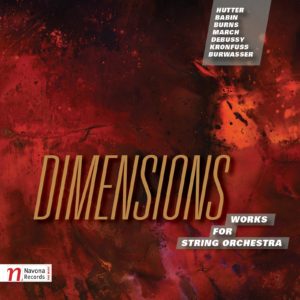Dimensions Vol. 5
Nan Avant composer
Christine Jancarz composer
Matthew Hetz composer
Joseph T. Spaniola composer
Scott Brickman composer
Lawrence Mumford composer
Pietro Mascagni composer
Hot on the heels of its preceding installments, DIMENSIONS VOL. 5 from Navona Records highlights the works of seven celebrated composers. These orchestral pieces showcase a broad range of innovative compositional styles featuring traditional and modern influences, drawing inspiration from an opera about a mystical wolf, moments of uncertainty and reflection in life, the music of Handel, and traditional Latvian folk music, just to name a few. Leveraging musical passion and orchestral ferocity, DIMENSIONS VOL. 5 offers listeners a broad example of some of the most exciting work in contemporary orchestral music.
Listen
Stream/Buy
Choose your platform
Track Listing & Credits
| # | Title | Composer | Performer | |
|---|---|---|---|---|
| 01 | Rememoramini | Nan Avant | Charlene Farrugia, piano; Franko Božac, bandoneon; Zagreb Festival Orchestra | Miran Vaupotić, conductor | 5:16 |
| 02 | Fate of the Wolf Concert Overture | Christine Jancarz | Moravian Philharmonic Orchestra | Jiří Petrdlík, conductor | 7:51 |
| 03 | Concerto for Flute, Celesta, and Chamber Orchestra | Matthew Hetz | Dieter Flury, flute; Lucie Kaucká, celesta; Janáček Philharmonic Ostrava | Jiří Petrdlík, conductor | 13:08 |
| 04 | The First Step | Joseph T. Spaniola | Radek Joska, bassoon; Janáček Philharmonic Ostrava | Stanislav Vavřínek, conductor | 10:02 |
| 05 | Sinfonia: I | Scott Brickman | Filharmonie Brno | Jiří Petrdlík, conductor | 4:07 |
| 06 | Sinfonia: II | Scott Brickman | Filharmonie Brno | Jiří Petrdlík, conductor | 3:42 |
| 07 | Sinfonia: III | Scott Brickman | Filharmonie Brno | Jiří Petrdlík, conductor | 3:32 |
| 08 | Sacrifice (from Symphony No. 4) | Lawrence Mumford | Janáček Philharmonic Ostrava | Jiří Petrdlík, conductor | 6:11 |
| 09 | Intermezzo Sinfonico | Pietro Mascagni | South Czech Philharmonic | Miran Vaupotić, conductor | 3:43 |
The recording of Concerto for Flute, Celesta and Chamber Orchestra is dedicated to the memory of Frances Schumacher Hetz, the composer’s Mom.
Rememoramini
Recorded January 17, 2023 at Vatroslav Lisinski Concert Hall Theatre in Zagreb, Croatia
Producer Krešimir Seletković
Engineer Filip Vidović
Editing & Mixing Melanie Montgomery
Fate of the Wolf Concert Overture
Recorded September 12, 2022 at Reduta Hall in Olomouc, Czech Republic
Producer Pavel Kunčar
Engineer Aleš Dvořák
Editing & Mixing Lucas Paquette
Concerto for Flute, Celesta, and Chamber Orchestra; Sacrifice (from Symphony No. 4)
Recorded December 5-6, 2022 at Vesmír Concert Hall in Ostrava, Czech Republic
Producer Jan Košulič
Engineer Aleš Dvořák
Assistant Engineer Adam Janků
Editing Jan Košulič
Additional Editing & Mixing Melanie Montgomery
The First Step
Recorded August 30, 2022 at Cooltour Ostrava in Ostrava, Czech Republic
Producer Jan Košulič
Engineer Aleš Dvořák
Assistant Engineer Jan Balcar
Editing & Mixing Lucas Paquette
Sinfonia
Recorded November 18, 2022 at Besední dům in Brno, Czech Republic
Co-Producer Jan Košulič
Producer & Engineer Jaroslav Zouhar
Editing Jan Košulič
Additional Editing & Mixing Melanie Montgomery
Intermezzo Sinfonico
Recorded January 13, 2022 at The Church of St Anne (Kostel svaté Anny) in Čecké Budějovice, Czech Republic
Producer Jan Košulič
Engineer Aleš Dvořák
Assistant Engineer Pavel Paluřík
Editing & Mixing Melanie Montgomery
Mastering Melanie Montgomery
Executive Producer Bob Lord
A&R Director Brandon MacNeil
A&R Danielle Sullivan, Chris Robinson
VP of Production Jan Košulič
Production Director Levi Brown
Audio Director Lucas Paquette
Production Manager Martina Watzková
Production Assistant Adam Lysák
VP, Design & Marketing Brett Picknell
Art Director Ryan Harrison
Design Edward A. Fleming, Morgan Hauber
Publicity Patrick Niland, Aidan Curran
Artist Information
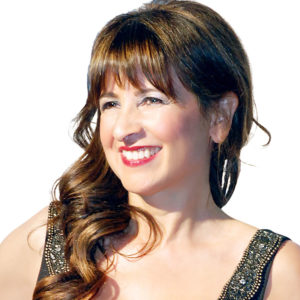
Nan Avant
Nan Avant’s music embraces thematic and rhythmic intentions often reflecting her Latin heritage, encompassing her passion for classical, jazz, world, and ethnic music. Avant has won numerous awards including two Global Music Awards Silver Medals in 2022, was named a Finalist for The American Prize in orchestral composition and is a four-time nominee in the Hollywood Music in Media Awards. Avant’s Tributum for Celtic Bagpipes and Orchestra, recorded by the Royal Scottish National Orchestra, is on the ballot for first-round voting in the 65th Grammy Awards. Tributum enjoys airplay around the world, from Ireland’s Public Radio in the United Kingdom to Hawaii’s Maui Celtic Radio in the United States, and already boasts a Best Instrumental Song Award at the 13th Annual Independent Music Vox Populi Awards.

Christine Jancarz
Storytelling is an important aspect in much of the music of American composer Christine Jancarz. Her recognizable melodies and rhythms are similar to the main characters of a novel, and along with aspects such as orchestration attempt to convey a narrative. Recurring melodies and rhythms are easily identifiable; like characters in a book, they become familiar. Much of her music is influenced by rock, jazz, and classical styles. She also frequently uses counterpoint, and mathematical concepts in her works, such as her Melodic Matrix series for solo instruments.
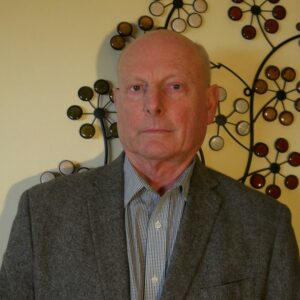
Matthew Hetz
Matthew Hetz (b. 1957) is a native to Los Angeles where he still resides. His formal music studies began at age 16 with piano lessons, and composing has always been in the forefront. He began playing the violin in his 20s, and joined local orchestras, an experience of tremendous importance and influence for composing. His study of composition and music at California State University, Dominguez Hills in the 1980’s was at the height of atonality, with the dissolution of harmony as the accepted compositional practices.

Joseph T. Spaniola
Dr. Joseph T. Spaniola is a composer on a passionate quest to engage the hearts and minds of audiences and performers through the communicative powers of music. Spaniola is active as a composer, arranger, educator, conductor, lecturer, producer, clinician, and adjudicator. He has composed works for band, orchestra, chamber ensembles, solo instruments, voice, choir, and electronic tape.

Scott Brickman
Scott Brickman (b. 1963, Oak Park IL) is passionate about sport and his Baltic and Slavic ancestry and culture. A cancer survivor, he has run 5k and 10k races in both the United States and Canada and anticipates adding Europe to that list. Starting in 2018, he has attended summer school at the University of Latvia in Riga, studying Latvian Language and Culture.

Lawrence Mumford
Lawrence Mumford's music, published by eight different companies, has premiered in cities across the country. Movements from his Symphony No. 4 have recently become a part of the broadcast libraries of the largest classical radio stations in Boston, Washington DC, Cleveland, Los Angeles, San Francisco, and other cities, and have been played repeatedly — even being included in two stations’ “Ultimate Playlist.” This music is also available on major streaming services including Spotify, Amazon Music, and Apple Music.

Zagreb Festival Orchestra
The Zagreb Festival Orchestra was founded in 1989, comprised of the top classical performers in Croatia and formed with the intent to record a single album. That intent was fulfilled with OVERTURES, a record of composer Gioachino Rossini’s greatest operatic works conducted by the acclaimed maestro Michael Halász, a resident conductor at the Vienna State Opera for 20 years, and produced by six-time GRAMMY Award winner Martin Sauer.
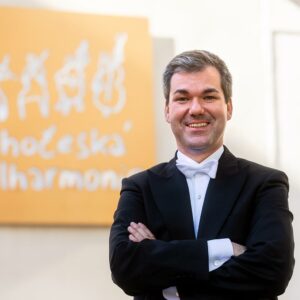
Miran Vaupotić
Acclaimed as “dynamic and knowledgeable” by the Buenos Aires Herald, Croatian conductor Miran Vaupotić has worked with eminent orchestras including the London Symphony Orchestra, the Royal Scottish National Orchestra, the Berliner Symphoniker, the Russian National Orchestra, the Slovak Radio Symphony Orchestra, the Prague Radio Symphony Orchestra, the Budapest Symphony Orchestra MÁV, Orchestre de Chambre de Genève, the Cairo Symphony Orchestra, Orquesta Sinfónica Nacional Argentina, and others, performing in major halls around the globe such as Carnegie Hall, Wiener Musikverein, Berliner Philharmonie, Rudolfinum, Smetana Hall, Victoria Hall, Forbidden City Concert Hall, Shanghai Oriental Art Center, Dubai Opera, Tchaikovsky Hall, International House of Music, CBC Glenn Gould Studio, and more.
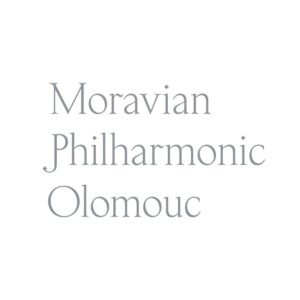
Moravian Philharmonic Orchestra
The Moravian Philharmonic Orchestra is one of the foremost and oldest symphony orchestras in the Czech Republic. It is based in the historical capital of Moravia, the city of Olomouc, and has been a leader of music activities in the region for the past 70 years. Its artistic development was directly influenced by distinguished figures from the Czech and international music scene.
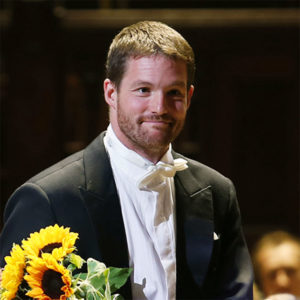
Jiří Petrdlík
Jiří Petrdlík (b. 1977) is appreciated as one of the most respectable conductors of his generation. He studied piano, trombone, and conducting — 1995–2000 at Prague Conservatory, and 2000–2005 at Academy of Performing Arts Prague — with Hynek Farkač, Miroslav Košler, Miriam Němcová, Radomil Eliška, and Tomáš Koutník, and took part in the masterclasses of the New York Philharmonic Principal Conductor Kurt Masur and the BBC Philharmonic Principal Conductor Jiří Bělohlávek. Petrdlík also successfully took part in several competitions, including the Donatella Flick Conductor Competition in London.
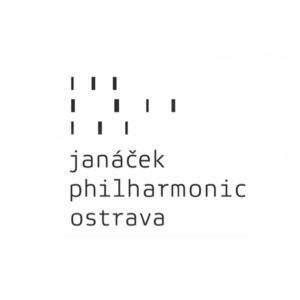
Janáček Philharmonic Ostrava
The Janáček Philharmonic is a world-class symphony orchestra based in Ostrava, Czech Republic and an emerging figure on the international performance scene. With over 100 top-level musicians, the orchestra aims to introduce unique, quality repertoire while showcasing their own recognizable sound.
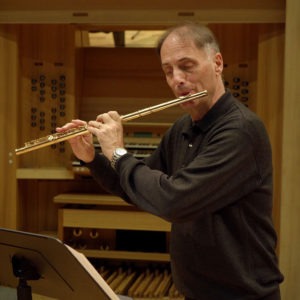
Dieter Flury
Dieter Flury was born and brought up in Zurich (Switzerland) and studied with Hans Meyer (Principal Flute of the Tonhalle Orchestra Zurich), André Jaunet (at the Zurich Music Academy), and Aurèle Nicolet. In addition to his flute studies he graduated in mathematics at the Federal Institute of Technology in Zurich. At age 25 he was appointed a member of the Vienna State Opera Orchestra and in 1981 he was named Principal Flute of the Vienna Philharmonic Orchestra.
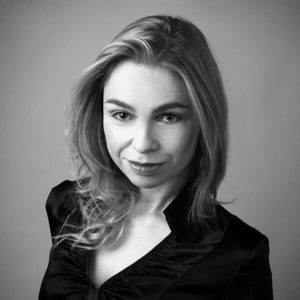
Lucie Kaucká
The pianist Lucie Kaucká was born on March 31, 1978 in Kraslice near Karlovy Vary, where she began studying music at the age of seven. She continued her piano studies at the Conservatory of Teplice and the Conservatory of Pardubice with Martin Hröel. After graduation from Pardubice she concentrated on the study of musicology at the Palacky University in Olomouc and finished successfully there in 2003.
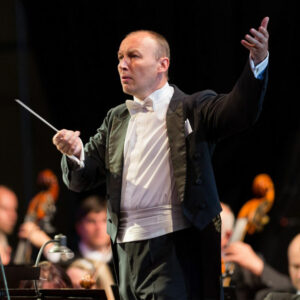
Stanislav Vavřínek
Stanislav Vavřínek is one of the most prominent Czech conductors and has been Chief Conductor of the Czech Chamber Philharmonic Orchestra Pardubice since 2018. Having graduated from the Conservatory in Brno where he studied flute and conducting, he continued his education at the Academy of Performing Arts in Prague. Subsequently, he also took master classes with Roberto Benzi in Switzerland, culminating with a concert in which he conducted the Biel Philharmonic Orchestra.

Filharmonie Brno
Since its earliest days, Filharmonie Brno has established a profile as a Janáčkian orchestra, thus making a substantial contribution to the cultural life of Brno — where Leoš Janáček composed nearly his entire oeuvre — and becoming an enthusiastic champion of his music. Since its foundation in 1956, the orchestra has regularly performed Janáček’s works in concerts at home and abroad; it has also recorded, multiple times, his complete symphonic works and cantatas.

South Czech Philharmonic
Originally known as The South Bohemian State Orchestra, the South Czech Philharmonic, based in České Budějovice (Budweis), was founded in 1981. Today, it comprises 39 artists and remains the only professional philharmonic orchestra in the South Bohemian region.
Notes
Videos
An Inside Look: Scott Brickman – Sinfonia
